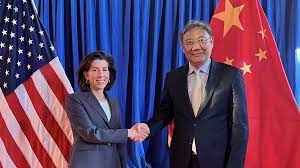Washington, May 26:Commerce Secretary Gina Raimondo and her Chinese counterpart, Wang Wentao, expressed concern Thursday about policies of each other’s governments following Chinese raids on consulting firms and U.S. Curbs on exports of semiconductor technology, their governments said.
The two sides announced no progress in disputes over technology and security but said Raimondo and Wang promised to strengthen exchanges on trade issues.
Companies from both sides have been buffeted by tighter official controls on trade in semiconductors and other activity on security grounds. Political relations between the two governments are at their lowest level in decades following disputes over technology, security, China’s territorial claims and Beijing’s treatment of Hong Kong and ethnic minorities.
Raimondo “raised concerns” about Chinese actions against U.S. Companies in China, her office said in a statement. It said they also discussed the trade and investment environment and “areas for potential cooperation” but gave no details.
Chinese police raided offices of consultants Bain & Co. And Capvision and a due diligence firm, Mintz Group, following the expansion of national security and intelligence laws. Authorities have given no explanation for the raids.
The raids rattled foreign companies, which the British Chamber of Commerce in China said this week want “greater clarity” about enforcement. Chinese authorities have said companies are obliged to obey the law but have given no indication whether they see possible violations.
Wang “expressed key concerns” about U.S. Policy on semiconductors, exports and trade, his ministry said. It gave no details.
Chinese leader Xi Jinping in March accused Washington of trying to hold back China’s development after the U.S. Government blocked access to technology to manufacture advanced processor chips, hampering the ruling Communist Party’s efforts to develop its own semiconductor producers for smartphones, artificial intelligence and other advanced applications.
President Joe Biden has tightened restrictions imposed by his predecessor, Donald Trump, on access to design, manufacturing and other technologies that Washington and its allies say might be used to improve Chinese weapons at a time when Beijing is threatening to attack Taiwan and is involved in territorial disputes with other neighbors.
The two governments have yet to resume face-to-face negotiations over ending a tariff war that was sparked by Trump’s increase in import taxes on Chinese goods over complaints about Beijing’s industrial policy and complaints about technology theft.
Wang was due to meet later with the U.S. Trade representative, Kathering Tai, according to the Chinese government.
Wang is in the United States to attend the Asia-Pacific Economic Cooperation meeting in Detroit. (AP)


